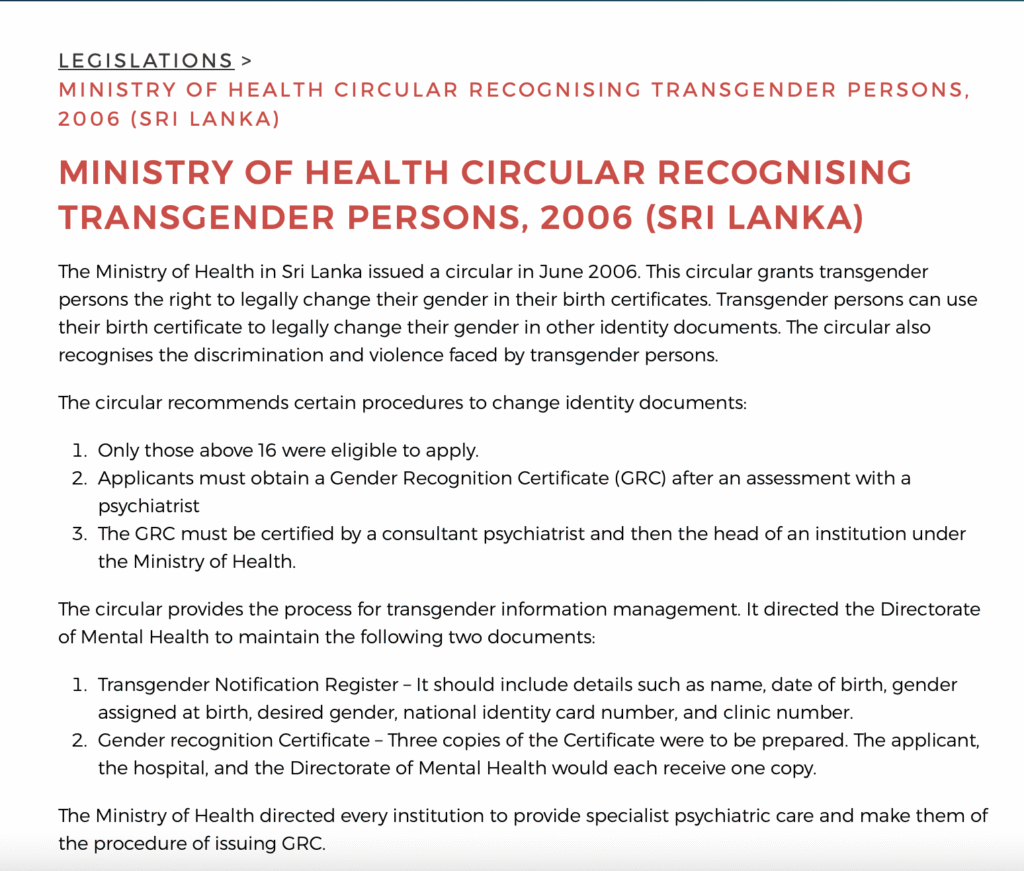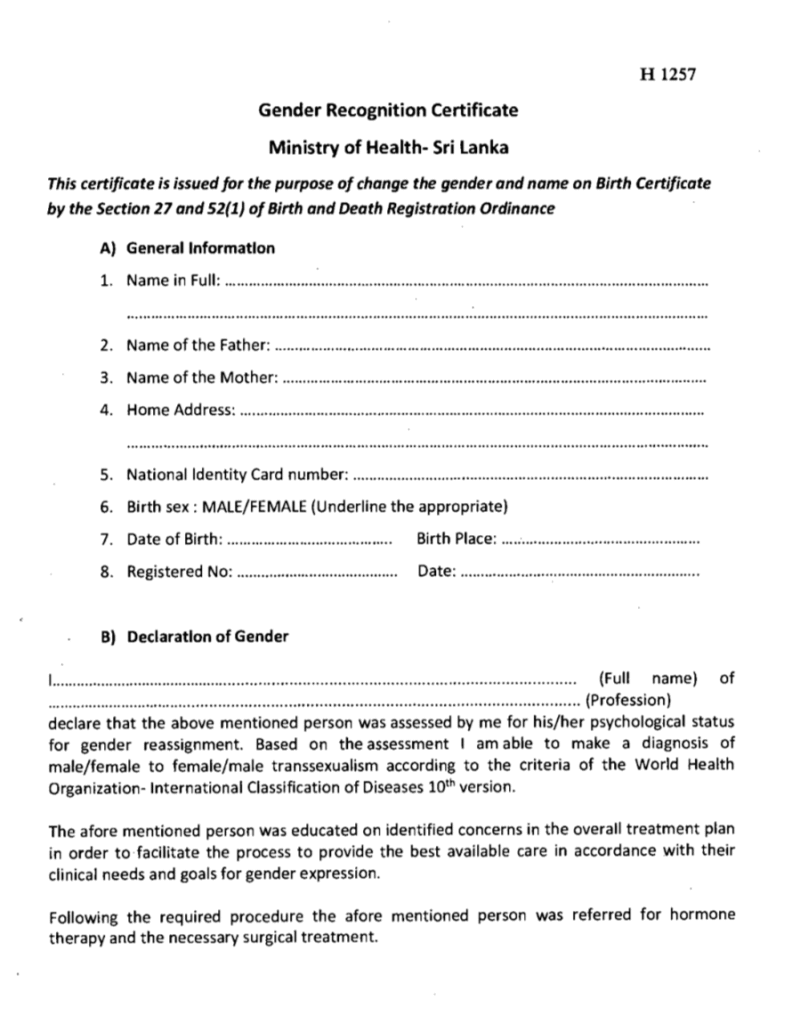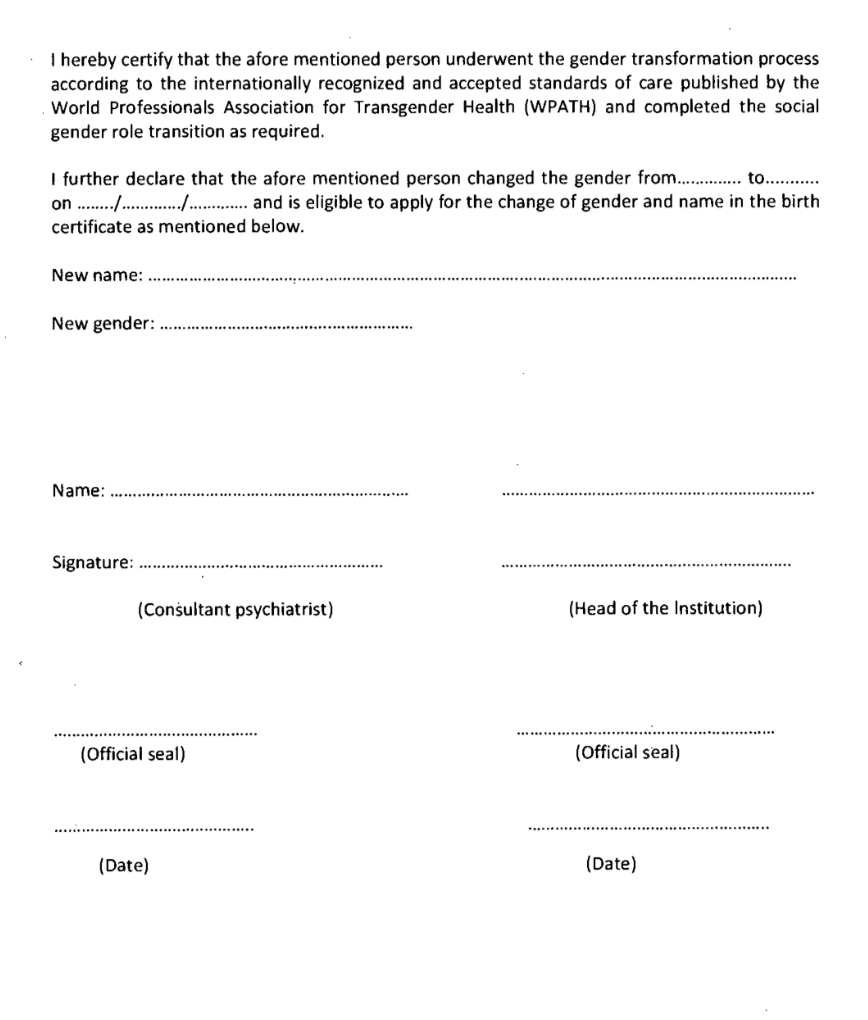How Legal Is the Gender Recognition Certificate (GRC) in Sri Lanka?
Posted on November 21st, 2025
Shenali D Waduge
by Shenali Waduge · 21st November 2025

- What Exactly Is the Gender Recognition Certificate?
The Gender Recognition Certificate (GRC) in Sri Lanka is not a law, not a statutory instrument, and not a legal entitlement.
It is merely an administrative document issued by the Ministry of Health through Circular No. 01-34/2016, authorising a change of gender marker on certain official documents such as the NIC or birth certificate.
Key Facts
- It is an administrative approval, not created by Parliament.
- It has no statutory forceand does not create legal rights.
- It is managed through an internal process of the Mental Health Directorate.
- It operates only so long as the Ministry chooses to implement it.
This means the GRC is legally unstable, constitutionally vulnerable, and administratively inconsistent.
- Administrative Circular vs Statutory Right
Statutory rights
- Created by Bills/Acts in Parliament
- Binding & changed by repeal or amendments only
Administrative Circulars
- Issued by Ministry/Dept
- Not enforceable in court & can be reversed
- Cannot alter Acts or Constitutional provisions
- Can be withdrawn / cancelled easily
- Administrative circular CANNOT change a person’s legal sex or alter rights related to birth sex, marriage, divorce, penal offences, prisons, adoption, inheritance etc
Yet the GRC attempts to do exactly that.
- Why the GRC Is Potentially Ultra Vires(Beyond Legal Authority)
- The Ministry of Health has no legislative power to alter legal sex.
Only Parliament can do so. - The Registrar General, Police, Prisons Department, and Judiciaryare bound by laws passed by Parliament — not by health circulars.
- The GRC therefore:
Creates a de facto legal sex change without legal authority
Directly conflicts with existing laws, especially:
- Penal Code 365 / 365A
- Marriage Registration Ordinance
- Prison Ordinance
- Evidence Ordinance
- Birth and Death Registration Act
- Any GRC-based decision can be challenged and struck down in court.
- Criminal Justice, Public Safety & Law Enforcement Risks
Prisons & Detention
A GRC male holder claiming to identify as a woman may demand placement in female facilities.
This creates:
- Safety risks
- Privacy violations
- Legal contradictions
- Internationally documented abuse cases.
Identity Manipulation & Evasion
Because the GRC can be obtained administratively:
- Offenders can exploit identity changes
- Cross-province evasion is possible – commit a crime / obtain GRC & live in another province.
- Criminal record matching becomes difficult
Penal Code Conflict
Sections 365 and 365A apply to biological sex.
An administrative gender change does not alter legal criminal responsibility, but it creates ambiguity that defence lawyers may exploit.
- Implementation Timeline
- 2006– First circular recognising transgender persons (circular cannot be located)
https://translaw.clpr.org.in/legislation/gender-recognition-circular-by-ministry-of-health-sri-lanka-2006/ (mentioned in South Asian Translaw Database)

- 16 June 2016– Circular 01-34/2016 formalises the GRC process.
Signed by: Dr. P.G. Mahipala, DGHS.
Administered by: Mental Health Directorate.
https://mentalhealth.health.gov.lk/images/Resources/01_34_2016_en.pdf
- No parliamentary debate.
- No Attorney-General review.
- No inter-ministerial consultation.



- Components & Procedure of the Sri Lankan GRC
Eligibility
- Above 16 years
- Below 21years requires parental consent
Process
- Psychiatric evaluation
- Hospital recommendation
- Validation by psychiatrist + hospital director
- Entry in the Transgender Notification Register (TNR)
- Issuance of certificate
Problems
- Clinically intrusive
- No privacy safeguards
- No legal guarantee
- Inconsistent application across hospitals
- Constitutional Problems
Equality (Article 12)
GRC privileges a category without Parliamentary authority.
Freedom of Thought, Religion & Culture (Articles 10, 14, 27(14))
Imposing a gender ideology via circular bypasses public morality protections.
Supreme Court (2024) – Gender Equality Bill
Court explicitly refused legal recognition of gender identity”.
This means a GRC relying on gender identity” is constitutionally incompatible.
- Child Protection, Marriage & Family Law Risks
Marriage Law
Marriage is based on biological male/female.
A GRC cannot override:
- Marriage Registration Ordinance
- Kandyan/Thesawalamai/Muslim personal laws
Adoption & Guardianship
A GRC could be misused to:
- Access gender-specific adoption rights
- Alter inheritance claims
- Create documentation inconsistencies
Custody & Divorce
A parent changing sex administratively will create legal conflict with:
- custody
- maintenance
- family law courts
- Data Privacy Crisis — No Protection for Sensitive Records
The TNR contains:
- psychiatric evaluations
- medical history
- identity information
There is no Sri Lankan data-protection law strong enough to safeguard this.
Records can be leaked or misused.
- International Abuse Examples
- United Kingdom
- GRC holders attempted to enter women’s prisons
- Criminal offenders exploited GRC for lenient placement
- Marriage and identity disputes arose
- Government revised policies (strip-searching based on biological sex)
- Ireland
- Self-ID GRCs used to access gendered benefits and services
- Legal conflicts over prisons and healthcare
- Australia
- Identity fraud and evasion using GRC-linked documents
Lesson:
Even in countries with strong legal frameworks, GRC systems are exploited unless tightly regulated.
- UK Supreme Court Ruling (2024) – An Important Global Lesson
In For Women Scotland Ltd v Scottish Ministers (2024), the UK Supreme Court unanimously ruled that:
Sex” in the Equality Act 2010 means biological sex, not the sex on a Gender Recognition Certificate.
Key points:
- A GRC cannot change biological sex in law.
- Women-only services may legally restrict entry based on biological sex.
- Public institutions must use biological sex in high-risk contexts (prisons, police searches, healthcare wards).
- Trans persons remain protected under gender reassignment,” but sex-based protections are biologically grounded.
This ruling demonstrates that even the UK — which has a detailed GRC law — does NOT allow a GRC to override biological sex.
Sources (Official & Media)
- UK Supreme Court case page:
https://www.supremecourt.uk/cases/uksc-2023-0091.html - Judgment PDF:
https://www.supremecourt.uk/cases/docs/uksc-2023-0091-judgment.pdf - BBC:
https://www.bbc.com/news/uk-67641544
- The Guardian:
https://www.theguardian.com/society/2024/nov/15/supreme-court-rules-sex-biological-women-trans
- HRW response:
https://www.hrw.org/news/2024/11/18/uk-supreme-court-ruling-trans-rights-concerns
Why the UK Supreme Court Ruling (2024) is relevant for Sri Lanka
In For Women Scotland Ltd v. Scottish Ministers (2024), the UK Supreme Court delivered a landmark judgment with direct relevance to Sri Lanka’s GRC debate.
Core Determination of the UK Supreme Court
The Court held that:
Sex” in the Equality Act 2010 means biological sex — not the sex recorded on a Gender Recognition Certificate.
Key Legal Outcomes
- A GRC does not change biological sex in law.
- Public bodies must usebiological sex when applying laws and policies concerning:
- single-sex spaces
- prisons
- healthcare wards
- searches
- safeguarding
- A GRC cannot override laws that depend on biological sex.
- Transgender persons remain protected under gender reassignment,” but that protection doesnot entitle them to override sex-based rights of others.
- Even in a country with aParliament-approved Gender Recognition Act, the GRC is legally limited and cannot redefine biological sex.
Why this supports Sri Lanka
If even the UK — with:
- aGender Recognition Act (2004),
- a detailed legislative scheme passed in Parliament, and
- judicial oversight,
still rules that a GRC cannot change biological sex,
then Sri Lanka, which has no Act, no legal framework, and only an administrative circular, cannot allow a GRC to alter or contradict:
- Penal Code
- Marriage and family law
- Prison and detention policy
- Birth registration
- Gender-based protections
- Constitutional interpretation
The UK’s highest court confirms a foundational principle:
Legal sex = Biological sex. Administrative documents cannot change it.
This makes the Sri Lankan GRC — issued merely through a Ministry circular — legally indefensible and constitutionally incompatible.
Marriage After Administrative GRC = Deception (Sri Lanka & International Context)
Sri Lanka’s Gender Recognition Certificate (GRC) is purely administrative, with no statutory force. Under the Marriage Registration Ordinance, legal marriage requires biological male and female partners.
If a person uses a GRC to present themselves as the opposite sex and enters marriage:
- Theymisrepresent their legal sex,
- Conceal a fundamental factaffecting consent, and
- Create grounds for the marriage to beannulled as voidable for deception.
International Examples:
- UK (R v McNally, 2013):Non-disclosure of biological sex in sexual relationships can amount to fraudulent deception.
- Singapore (Lim Ying v Hiok Kian Ming, 1991):Marriage annulled when a spouse presented as the opposite sex.
- Australia & Ireland:Legal disputes arose over marriage and rights based on administrative gender recognition.
Even if a GRC exists administratively, it cannot override birth certificates or statutory marriage law. Churches and civil authorities therefore have a valid legal basis to challenge such marriages as contrary to law and public policy.
Sources
https://supremecourt.uk/cases/uksc-2024-0042
- Who Is Responsible?
A Breakdown of Policy Failure
- Ministry of Health (Primary Authority)
- Issued a circular beyond legal authority
- No consultation with AG, Justice Ministry, Registrar General
- Created a de facto sex-change mechanism
- Human Rights Commission
- Promoted GRC without examining:
- Penal Code conflict
- Constitutional conflict
- Religious/cultural implications
- Mental Health Directorate
- Designed sensitive medical procedures without statutory mandate
- Created a database (TNR) with no legal privacy protections
- Oversight Failures by Public Officials
No one assessed:
- Criminal evasion risks
- Marriage & family law conflict
- Prison placement conflict
- Identity fraud
- Cultural/moral implications
- Warnings Ignored
Religious leaders (e.g., Cardinal Malcolm Ranjith) warned about foreign ideological influence — ignored.
- Recommendations
Immediate
- Suspend GRC issuance pending legal review
- Forensic audit of TNR privacy risks
- Inter-ministerial committee with Justice, AG, Police, Prisons, Registrar General
Medium-Term
- Draft legislation (if policy continues) with:
- strict eligibility
- non-self-ID processes
- judicial oversight
- criminal accountability clauses
Long-Term
- Align with Constitution
- Protect public morality (Article 27(14))
- Ensure child protection priority
- Guarantee law-enforcement clarity
Sri Lanka’s GRC system is administratively created, legally weak, constitutionally questionable, and highly vulnerable to misuse.
International experience — especially the 2024 UK Supreme Court ruling — confirms that biological sex remains the legal foundation of sex-based protections, identity, and public administration.
A mechanism of such magnitude cannot be introduced through a Ministry circular.
It requires Parliament, public debate, legal safeguards, and constitutional clarity.
Until then, the Sri Lankan GRC remains a legally unstable administrative instrument with serious national implications.
Shenali D Waduge